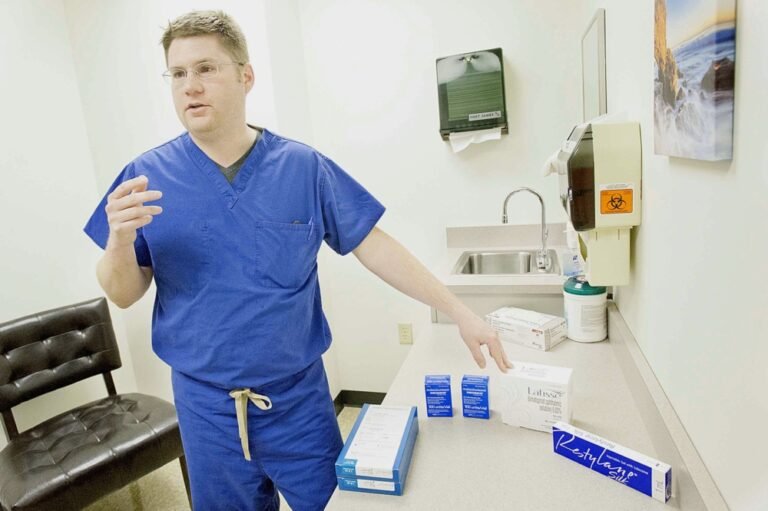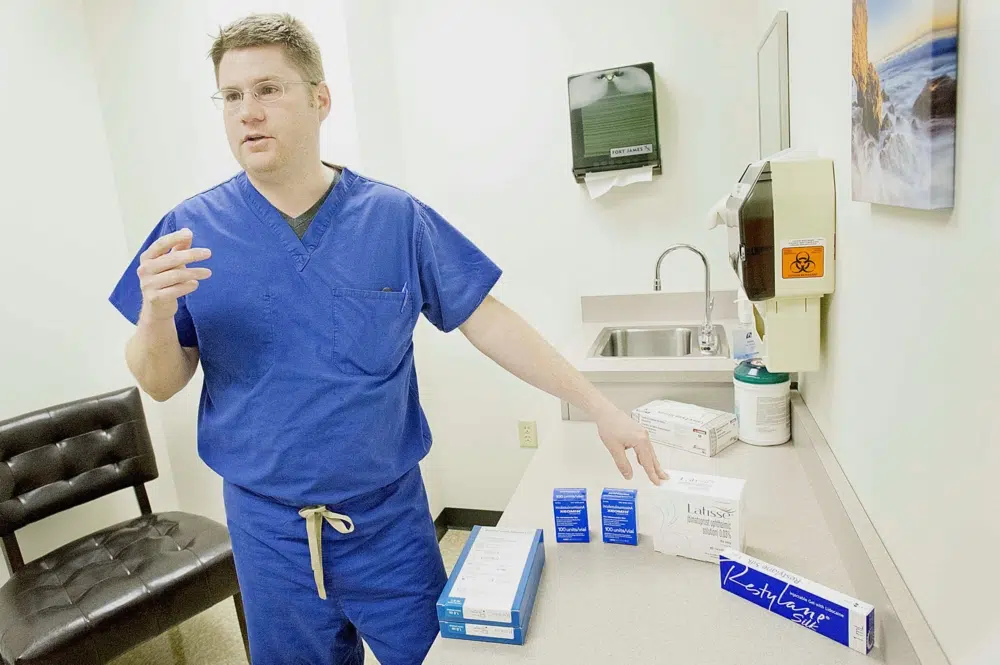
[ad_1]

The case of Dr. Adam B. Smith, a 40-year-old physician who practiced in Sioux City, illustrates how surgeons and other medical professionals can remain licensed in Iowa even after being accused of fraud, negligence and incompetence by colleagues, patients, prosecutors and licensing boards. (Photo by Justin Wan of the Sioux City Journal, courtesy of the Sioux City Journal)
DES MOINES, Iowa (KELO.com) — After having been the target of hospital sanctions, criminal charges, and 15 lawsuits brought by Iowa women who claim he left them injured or disfigured, an Iowa surgeon has voluntarily surrendered his medical license.
The action comes 17 months after South Dakota licensing authorities summarily suspended the doctor’s license in that state, and two years after various medical facilities suspended the doctor’s clinical privileges.
The case of Dr. Adam B. Smith, a 40-year-old physician who practiced in Sioux City, illustrates how surgeons and other medical professionals can remain licensed in Iowa even as they’re accused of fraud, negligence and incompetence by colleagues, patients, prosecutors and licensing boards.
“I have to live everyday with the pain and mutilation of my body that he caused,” one of Smith’s patients told the Iowa Capital Dispatch. The 40-year-old Woodbury County woman, who asked that her name not be used due to the nature of her medical condition, said she went to Smith because of recurring hernias that caused her abdominal muscles to separate. “I have suffered ongoing health issues due to the surgery — bladder and bowel issues which have caused sepsis multiple times.”
State and federal court records indicate that in 2011, at the age of 30, Smith was granted staff privileges at Munson Medical Center, a hospital in northern Michigan. In late 2012, the hospital reviewed Smith’s patient charts and concluded there was substantial evidence of Smith performing surgery to correct nonexistent patient injuries, with one reviewer expressing concern that Smith was committing fraud.
After the hospital commissioned a second review, in 2013, more problems were uncovered. The hospital suspended Smith’s craniofacial surgery privileges for 30 days. After his reinstatement, the hospital reviewed an additional 14 patient files and found problems with Smith’s actions in 12 of the cases. As before, one of the reviewers suspected fraud, according to federal authorities.
In January 2014, Smith relinquished his privileges at Munson. By April of that year, he had moved to western Iowa and joined a Sioux City physicians’ group named Tri-State Specialists, which operated out of a surgical center called Pierce Street Same-Day Surgery. A few weeks later, Smith was named to the group’s Board of Managers and in July, the Iowa Board of Medicine granted him an Iowa medical license. According to court records, Smith was granted privileges at UnityPoint Health and St. Luke’s Regional Medical Center in Sioux City.
Within a few months, Smith and a group of other area doctors began soliciting business for a competing business in which they allegedly had a stake: Riverview Plastic Surgery. Court records indicate Smith appeared at a “Ladies Night Out” event in Sioux City on behalf of Riverview, offering wine, hors d’oeuvres and “Botox specials” to those who attended. Advertisements for the event stated:
“ASK THE DOC! Adam Smith, M.D., board certified plastic surgeon, will be on hand to answer any questions you have…”
In a 2018 deposition, Smith indicated the number of patients he saw each week was significant.
“I had to move a bunch of patients this morning, so I had to see 15 before I came in today,” he told the lawyer who was questioning him. “Typically, Monday, Tuesday and Thursday, I see patients in the morning. Wednesday, I see patients in the afternoon. That’s in the clinic. And then Fridays I rotate between Yankton (South Dakota) and Le Mars. And then, whenever I’m not seeing patients, I have operative time.”
In late 2018, lawyers for the federal government filed a civil lawsuit against Smith, alleging he had committed fraud while at Munson. In one instance, they alleged, Smith operated on an 89-year-old Medicare patient who had fallen and sustained facial fractures. Reviewers concluded that not only was the operation unnecessary, but that a portion of the surgery for which he had billed Medicare had never taken place. The patient died from complications within days of the operation, federal authorities alleged.
In September 2019, the South Dakota Board of Medical and Osteopathic Examiners summarily suspended Smith’s license in that state, noting that his clinical privileges had been suspended at five medical facilities during the previous nine months due to allegations of patient abandonment, failure to provide adequate patient care and other issues.
A few weeks later, a federal grand jury indicted Smith on charges related to his work at Borealis Plastic Surgery in Michigan, where he had worked from 2011 through 2013. Prosecutors alleged Smith defrauded insurers by coding cosmetic procedures as non-cosmetic operations.
By that time, Smith had been sued for malpractice or medical neglect by at least eight Iowa women who claimed they were injured or left disfigured by Smith: Tarsila Ramirez of Sergeant Bluff; Christina Fox of Woodbury County; Chaseann Goodrich of Sioux City; Jessica McHugh of Woodbury County; Sarah Surber of Allen, Neb.; Karen Ramos of Sioux City; Lauren Curtis of Sergeant Bluff; and Jena Reyes of Dakota Dunes, S.D.
Smith, who did not respond to calls from the Capital Dispatch, denied any wrongdoing. He prevailed in the Ramirez case, and none of the others went to trial. A ninth case from 2019, filed by Alyssa Pratt of Sioux City, is scheduled for trial in 2022.

Smith was still licensed to practice in Iowa. In July 2019, the Iowa Board of Medicine had filed its own statement of charges against him, but unlike South Dakota, the Iowa board didn’t summarily pull Smith’s license. The board did, however, allege that between December 2014 and September 2017, Smith had failed to provide appropriate surgical care to 17 of his patients in Sioux City.
The board claimed Smith’s patient care was inadequate with regard to patient selection; informed consent; surgical execution; surgical judgment and decision-making; postoperative care; the excessive prescribing of narcotics; medical records; and billing practices.
Last year, with the Iowa licensing board case — as well as the federal civil and criminal cases — still pending, the number of malpractice claims against Smith continued to mount.
In 2020, Smith was sued by Molly Strawn of Woodbury County; Charlene Jorgensen of Sioux City; Stephanie Hanner of Sioux City; Renee Hummel of Sioux City; Britni Hilts of Sergeant Bluff; and the family of the late Debra Anguiano of Sioux City. Each of those cases is still pending.
Late last year, the Iowa Board of Medicine filed an amended statement of charges against Smith, accusing him of professional incompetence; practicing in a manner harmful to the public; unethical or unprofessional conduct; inappropriate prescribing; knowingly making false statements to the public; and other infractions.
Still, Smith’s Iowa medical license remained active. It was scheduled to expire in May 2020, but an emergency proclamation from the governor, which kept medical professionals’ licenses from expiring during the COVID-19 pandemic, meant that Smith could, at least in theory, continue to practice medicine in Iowa.
Court records indicate Smith was scheduled to go to trial this month on the federal fraud charges, but a continuance was granted. A new trial date has yet to be set.
Seven Iowa women still have pending malpractice claims against Smith, but according to federal court records, Smith is now unemployed, has no source of income and could be facing 10 years or more in prison if convicted of fraud.
Two weeks ago, the Iowa Board of Medicine announced an agreement to settle its case against Smith by having him voluntarily surrender his Iowa medical license.
The board’s executive director, Kent Nebel, said he can’t comment on the Smith case specifically, but acknowledged the process of building a case against a doctor often leads to long delays with action taken only after the physician has stopped practicing.
“If you’re going to take formal, public disciplinary against a doctor, you had better be able to prove it and you better have experts to testify to it,” he said. “For the board to have a legal basis to suspend somebody’s license, the board needs to be able to prove that the physician is an immediate threat to the public.”
Iowa law specifies that hospitals and the licensees themselves have 30 days to inform the board of any disciplinary action that’s imposed. But Nebel noted the board can’t take action based solely on the findings of hospitals. Instead, it must conduct its own investigation and reach its own conclusions — all of which can take months, if not years. That’s particularly true in cases where multiple patients may have been harmed and thousands of medical records must be reviewed, he said.
In Smith’s case, six years passed between between his first alleged licensing violations in Sioux City and his recent agreement to surrender his license. During those years, Smith continued to operate on Iowans, resulting in the string of malpractice claims that includes one filed by an Iowa woman who says she has had to spend more than $60,000 on three corrective surgeries over the past four years.
“There’s the physical damage, and the years and the money it takes just so you can get back to where things were at the start, but the worst part is not knowing who you can trust after something like this,” said the former patient, who asked that her name not be used due to the nature of her medical condition. “You know, when it’s your doctor — that’s someone you’re supposed to be able to trust.”
Court records indicate Smith left Iowa sometime in late 2019, shortly after a $250,000 civil court judgment was levied against him in a business-contract lawsuit. After that, even his attorneys in Des Moines couldn’t locate him.
He initially moved to Charlotte, N.C., then to Minnesota, according to U.S. Probation and Pretrial Services. The agency says Smith traveled to North Dakota last fall where he helped with the harvest on a friend’s beet farm. He then returned to Minnesota, where he currently lives with a family member, rent free, in exchange for fixing up the house.
(Clark Kauffman with the Iowa Capital Dispatch contributed this report. It first appeared here in the ICD.)
[ad_2]
Source link